
2018
Quick Links
The following UTeach classes were taught during Spring 2018, under the leadership of Huitzi Contreras. Please click on one of the links below to be redirected to the course description of the course, including a biography of the instructor and class listing.
American Counterculture Movements
Devdas, Bollywood and Post-Colonial South Asia
Coming-of-Age Narratives
I Dream of Space, Representations of Women in Space Films
Inequality in Superhero Films
Intro to ASL and Deaf Culture
Introduction to Gangs
Malls and Sprawls
Mediums of Storytelling
Online Game Behavior, Toxicity in Online Gaming Communities
Disney’s Movie Magic
Sociology of TV Animation
Sound in Video Games
American Counterculture Movements
Michelle Meza
Majors: History and Film & Media Studies
Biography: 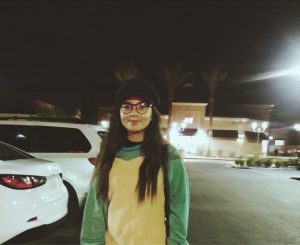 My name is Michelle, I am a fourth year Film and Media Studies & History double-major with a minor in Chicano/Latino Studies. I have been fascinated by history for as long as I can remember. I can trace this fascination back to when I discovered the show Liberty’s Kids at the age of seven. The show is set in colonial America and I was immediately intrigued by how society evolved from the colonial period to present day, from the clothes, gender roles, and societal norms. My interest in cultural history developed early on, but I only realized it was something that I wanted to research last year after taking a California history class that covered the hippie movement in San Francisco. That class sparked my interest to research counterculture movements and their impact on American culture today. In my spare time I enjoy watching movies, discovering new music, and trying new vegan restaurants.
My name is Michelle, I am a fourth year Film and Media Studies & History double-major with a minor in Chicano/Latino Studies. I have been fascinated by history for as long as I can remember. I can trace this fascination back to when I discovered the show Liberty’s Kids at the age of seven. The show is set in colonial America and I was immediately intrigued by how society evolved from the colonial period to present day, from the clothes, gender roles, and societal norms. My interest in cultural history developed early on, but I only realized it was something that I wanted to research last year after taking a California history class that covered the hippie movement in San Francisco. That class sparked my interest to research counterculture movements and their impact on American culture today. In my spare time I enjoy watching movies, discovering new music, and trying new vegan restaurants.
Course Description: What are counterculture movements and how have they influenced American culture? Why did these movements emerge when they did? Students enrolled in this course will learn the answers to these questions and others by examining the historical and socio-political contexts that shaped the emergence of countercultures during the twentieth century. We will pay special attention to the counterculture ideology, music, and fashion through analysis of song lyrics from artists like Bob Dylan, films, and novel excerpts. By the end of this quarter, students will understand the ideologies and practices that these movements opposed. Students will also learn mainstream society’s reception of these movements during their respective periods. The counterculture movements that will be discussed include beatniks, hippies, and punks.
Enrollment Information:
Time:W 12-12:50pm
Place: HH 224
Course Code: 87635
Faculty Mentor: Dr. Andrew Highsmith
Back to Top
Devdas, Bollywood and Post-Colonial South Asia
Gunindu Abeysekera
Major: Film & Media Studies

Biography: Hey all you film fanatics! My name is Gunindu Abeysekera, but everyone calls me Guni! I’m a third year Film & Media Studies major and International Studies minor graduating this quarter! Next year, I hope to be sticking around to complete my masters through the Asian-American Studies department to study the intersections of Black liberation and decolonization. As you may have noticed by my seminar description, I’m really interested in how media affects society, vise-versa, and how that functions cyclically! I’m inspired by the works of post-colonial theorists and activists, Angela Davis, Sumita Chakravarty, and Frantz Fanon in revealing the nuanced natures of these social issues. I am currently the Marketing Manager of the FRESH Basic Needs Hub on campus, focusing on finding creative ways to reach out to students and tackle hunger on campus. Earlier this year, a few friends and I started the campus organization “South Asian Student Union,” a space where we South Asian students can not only celebrate our diverse cultures, but also critique problematic aspects of it. If you haven’t fallen asleep already, in my free time, I try to run my own photography business and, well, eat carbs and obsess over videos of dogs because I don’t have any of my own. *tear* I’m excited to merge all my interests with you all in this seminar and hear what you have to say about all things media and society and jam to some Bollywood!
Course Description: Lights! Camera! Colonialism? By specifically looking at the major Bollywood film, Devdas, directed by Sanjay Leela Bhansali, we will explore the discourses of gender, class, and colonialism as intersectional forces in South Asia. After its grand premiere at the 2002 Festival de Cannes in France, Devdas proceeded to win 51 prestigious film awards domestically and internationally! It is important to highlight South Asia as “postcolonial” in our title because the film both takes place in and adapts a novel written in British India, but more importantly, the film’s social and political messages are relevant today! Though this amazing film will always be my favorite, it is important to analyze the problematic aspects of it in order to create a broader understanding of the development of South Asian culture and society.
Enrollment Information:
Time: Th 11:00-12:20pm
Place: TBD
Course Code: 87638
Faculty Mentor: Dr. Beheroze F. Shroff
Back to Top
Coming-of-Age Narratives
Melisa Lu
Majors: Psychology & Social Behavior, Education Sciences, and English
Biography:  Yo, peeps! My name’s Melisa (with one ‘s’), a fifth year triple majoring in Psychology & Social Behavior, Education Sciences, and English. Even though my course is about coming of age, I’m honestly not quite sure if I feel like an adult yet. Maybe we’re all just kids at heart, searching for our place in the world? Well, I digress. Youth is beautiful in a strangely masochistic way. It’s no wonder my future goals include teaching literature to high school students. Adolescents are all suffering and hope, with a touch of sass. They’re wonderful creatures.
Yo, peeps! My name’s Melisa (with one ‘s’), a fifth year triple majoring in Psychology & Social Behavior, Education Sciences, and English. Even though my course is about coming of age, I’m honestly not quite sure if I feel like an adult yet. Maybe we’re all just kids at heart, searching for our place in the world? Well, I digress. Youth is beautiful in a strangely masochistic way. It’s no wonder my future goals include teaching literature to high school students. Adolescents are all suffering and hope, with a touch of sass. They’re wonderful creatures.
Anyways, I’m just an open-minded nerd who loves coming-of-age narratives, storytelling, and existential musings. My life is full of meme trash. I also enjoy playing video games, reading/writing fanfiction, and indulging in anime/manga. You might otherwise find me lazing around like a tree because I enjoy sunlight and blue skies. Yeah, I’m an excited derp.
Course Description: What exactly does it mean to come of age? In other words, to “grow up”? Coming-of-age narratives like Spirited Away (2001) and Boyhood (2014) unfold in all kinds of ways. Sometime, heroes undergo significant rites of passages and gain emotional maturity. Other times, characters experience a more ambiguous series of transitions through everyday life. Think of it like a video game quest. You level up (or grow) because what doesn’t kill you (in puberty) gives you experience points! But each individual story reaches its endings in unique ways. So we’ll analyze how coming of age is construed in relation to (or even in conflict with) our understanding of childhood, emerging adulthood, and old age. We’ll also explore questions of how coming-of-age narratives exist as a critical/structural lens for human meaning, and how we navigate the wider world. Ultimately, what makes coming of age a journey?
Course Website: https://coming-of-age-narratives.tumblr.com/
Enrollment Information:
Time: F 12:00-12:50p
Place: DBH 1420
Course Code: 87644
Faculty Mentor: Dr. Jonathan Alexander
Back to Top
I Dream of Space, Representations of Women in Space Films
Gabrielle Wood
Major: History
Biography:  Hi! My name is Gabby and I am a 4th year history major here at UCI. While I typically look into a broad spectrum of topics, the Space Race and all things astronaut related have always been a special spot of interest for me. In the past, I have looked at the hiring practices of NASA’s in the 1960s and the story of the Mercury 13, a group of 1960s female astronaut hopefuls, as a lens to analyze the gender roles of the period. When not buried under a pile of reading, or at work, I can be found watching nearly anything and everything on Netflix- please don’t judge me by my queue. On top of being a space history nerd, I am also just a Science fiction loving nerd. This class is a homage to a few of my favorite things – Space and the Cold War, critical analysis into the role of gender, and some of the best and the worst space based media that the 20th century has to offer.
Hi! My name is Gabby and I am a 4th year history major here at UCI. While I typically look into a broad spectrum of topics, the Space Race and all things astronaut related have always been a special spot of interest for me. In the past, I have looked at the hiring practices of NASA’s in the 1960s and the story of the Mercury 13, a group of 1960s female astronaut hopefuls, as a lens to analyze the gender roles of the period. When not buried under a pile of reading, or at work, I can be found watching nearly anything and everything on Netflix- please don’t judge me by my queue. On top of being a space history nerd, I am also just a Science fiction loving nerd. This class is a homage to a few of my favorite things – Space and the Cold War, critical analysis into the role of gender, and some of the best and the worst space based media that the 20th century has to offer.
Course Description: This course explores how women are represented within space films and the broader culture of the 20th century, especially the Cold War period. Through the use of selected films and television episodes, this class will analyze the changing roles of women in space films and situate them within actual historical events and dominate social norms of the time. Topics will range from the first Russian Science fiction film Aelita all the way up to Hidden Figures, with themes such as the effect on space films on real space science, gender norm maintenance and subversion, and imaginings of the future being addressed. After the class, student will walk away with a greater grasp of the changing gender politics of the 20th century and how they are mediated through film- especially space films.
Enrollment Information:
Time: W 12:00-12:50pm
Place: TBD
Course Code: 87631
Faculty Mentor: Dr. Andrew Highsmith
Back to Top
Inequality in Superhero Films
Jonathan Agena
Majors: Asian American Studies
Biography: 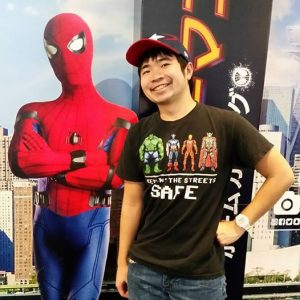 Hello fellow geeks and nerds! My name is Jonathan, and I’m a fourth-year undergrad, majoring in Asian American Studies and minoring in Film and Media. For as long as I can remember, I’ve always loved superheroes and sci-fi/fantasy movies and stories (Star Wars, Star Trek, Marvel, DC, Harry Potter, Avatar: The Last Airbender, to name a few). It just always fascinated me as to how people could create such fleshed-out characters, such nuanced themes and plotlines, and such impactful, societal power out of nothing but imagination and will. Pure geeky creation, one might say.
Hello fellow geeks and nerds! My name is Jonathan, and I’m a fourth-year undergrad, majoring in Asian American Studies and minoring in Film and Media. For as long as I can remember, I’ve always loved superheroes and sci-fi/fantasy movies and stories (Star Wars, Star Trek, Marvel, DC, Harry Potter, Avatar: The Last Airbender, to name a few). It just always fascinated me as to how people could create such fleshed-out characters, such nuanced themes and plotlines, and such impactful, societal power out of nothing but imagination and will. Pure geeky creation, one might say.
My Asian American Studies classes have helped me to understand, though, that the ugly reality of racism and inequality permeates everything, even our pop culture. Thus, my independent study with Dr. Judy Wu aims to combine my love of Asian American Studies with my love of geekdom and superheroes, so as to discover ways in which we can understand inequality so as to someday resolve it. And with that, INEQUALITY IN SUPERHERO FILMS was born!
Course Description: Here’s a challenge for ya: In ten seconds, name off the top of your head at least ten Asian superheroes that have starred in a Marvel or DC movie. Tough, right? Imagine if the challenge was instead to name white superheroes. It’d probably be much easier, wouldn’t it?
This is because race matters, particularly when it comes to Hollywood and its superhero film and television industry. Recent casting controversies such as Ghost in the Shell, Doctor Strange, and Iron Fist, seem to indicate that racial issues and inequality are still a part of our culture and society in America. And so, for ten weeks, we’ll discuss the various ways inequality remains a potent issue in Hollywood and the superhero film/television industry. This course will have a special focus on Asian Americans, but we will of course touch upon other minority groups and how they are influenced by inequality. By the end, students will be able to tackle a wide-range of issues and challenges that relate to the power and influence of U.S. popular culture, as well as the power and influence of race-based representations.
Course Website: https://eee.uci.edu/18s/87633
Enrollment Information:
Time: Tu 11:00-11:50am
Place: DBH 1420
Course Code: 87633
Faculty Mentor: Dr. Judy Tzu-Chun Wu
Back to Top
Intro to ASL and Deaf Culture
Murad Aldoghmi
Majors: Neurobiology
Biography: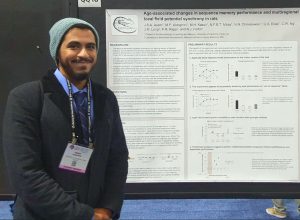 My name is Murad Aldoghmi and I am a 3rd year Neurobiology major here at UCI. I work at the International Center as an English Conversation Program intern where I lead two classes each week in coming up with activities and conversation starters to help International students practice their English skills. I’m also a Bio Sci Senator for the ASUCI Senate where I address and convey student complaints and ideas to administration. I love biking, taking cold showers, and learning how things work (for example, did you know that menthol tricks your tongue receptors into actually thinking they’re cold!?! Talk about an encourage-mint haha!). I currently run a club on campus called “Through Deaf Eyes” where students gather to learn new things about ASL and Deaf culture. This topic is very close to me because I took four years of ASL in high school and went on to test at Mt. SAC to obtain my seal of biliteracy and prove fluency in ASL and English. So now, through the UTeach program, I have the opportunity to share my knowledge to all students who are interested!
My name is Murad Aldoghmi and I am a 3rd year Neurobiology major here at UCI. I work at the International Center as an English Conversation Program intern where I lead two classes each week in coming up with activities and conversation starters to help International students practice their English skills. I’m also a Bio Sci Senator for the ASUCI Senate where I address and convey student complaints and ideas to administration. I love biking, taking cold showers, and learning how things work (for example, did you know that menthol tricks your tongue receptors into actually thinking they’re cold!?! Talk about an encourage-mint haha!). I currently run a club on campus called “Through Deaf Eyes” where students gather to learn new things about ASL and Deaf culture. This topic is very close to me because I took four years of ASL in high school and went on to test at Mt. SAC to obtain my seal of biliteracy and prove fluency in ASL and English. So now, through the UTeach program, I have the opportunity to share my knowledge to all students who are interested!
Course Description: Ever thought about what it’s like to communicate with those who cannot hear? Ever wondered what language and culture exists between those who are Deaf or hard of hearing? This class provides a space for students to learn American Sign Language and about Deaf Culture. The general topics this seminar would address are Deaf History, Deaf Culture, the differences in societal norms of the hearing and Deaf worlds, and basic American Sign Language grammar and conversational signs. These topics will be covered through lectures, interactive in-class signing, and video clips. This class aims to connect students to the Deaf community while learning the language along the way. This class also desires to inspire students to step outside of their comfort zone and explore the world they may have had no idea about: the Deaf World.
Enrollment Information:
Time: Tu 2:00- 3:20pm
Place: LLIB 101A
Course Code: 87634
Faculty Mentor: Dr. Lisa Pearl
Back to Top
Introduction to Gangs
Jasmeet Singh
Majors: Business Economics and Education Sciences
Biography:  My interest in gangs and how they impact our society stems from Dr. Valdez’s transnational gangs course that I took a few years ago. Personally, I believe that this issue is often overlooked due to ignorance and apathy, and that is the main reason I took the initiative to focus my research on why people choose to involve themselves in these types of organizations. My course will touch on how gangs use emotions, weapons, and power to control and instill fear in others as well as how and what types of operations transnational gangs are capable of carrying out.
My interest in gangs and how they impact our society stems from Dr. Valdez’s transnational gangs course that I took a few years ago. Personally, I believe that this issue is often overlooked due to ignorance and apathy, and that is the main reason I took the initiative to focus my research on why people choose to involve themselves in these types of organizations. My course will touch on how gangs use emotions, weapons, and power to control and instill fear in others as well as how and what types of operations transnational gangs are capable of carrying out.
Course Description: Defining what a “gang” is has become nearly difficult in our contemporary society. Gangs have been around since the 12th century and are still very active in our society today. This seminar will be focused on the history and formation of gangs and gang violence tracing all the way back to the 1600’s until the present and the illegitimate activities that gangs are able to perform nationally and transnationally.
Enrollment Information:
Time: W 11:00-11:50am
Place: DBH 1420
Course Code: 87641
Faculty Mentor: Dr. Caesar Sereseres
Back to Top
Malls and Sprawls
Huitzijared Contreras Miguel
Major: History, Political Science, and International Studies
Biography:  Hello there! My name is Huitzijared Contreras Miguel. I am a first generation college student who will be graduating from UCI this June. As a part of UCEAP, I spent 6 months studying abroad in the Netherlands where I explored my photography skills in 9 different countries; and also admired art, architecture, and a lot of gelato. Most recently I participated in UCDC where I interned for Senator Dianne Feinstein at Capitol Hill (and loved every minute of it!). I was raised in Los Angeles in the San Fernando Valley and became inspired to teach this class by the movies that used my town as background setting. You will most likely find me at any cafe reading about American politics, foreign policy, or thinking of ways to empower women in academia.
Hello there! My name is Huitzijared Contreras Miguel. I am a first generation college student who will be graduating from UCI this June. As a part of UCEAP, I spent 6 months studying abroad in the Netherlands where I explored my photography skills in 9 different countries; and also admired art, architecture, and a lot of gelato. Most recently I participated in UCDC where I interned for Senator Dianne Feinstein at Capitol Hill (and loved every minute of it!). I was raised in Los Angeles in the San Fernando Valley and became inspired to teach this class by the movies that used my town as background setting. You will most likely find me at any cafe reading about American politics, foreign policy, or thinking of ways to empower women in academia.
Course Description: On the sunny outskirts of Los Angeles is the San Fernando Valley, a region short on exciting pastimes, but full of malls. This class looks at the duality of suburban commercial spaces. Films such as Clueless, Boogie Nights, Fast Times at Ridgemont High, and TV shows like Parks and Rec, The Office, and Gilmore Girls all used the Valley in different ways—but echoed unique social, economic and political changes that occurred during the 1970s, 80s, 90s, and 2000s. Using popularized mass media as a guide, “Malls and Sprawls” will analyze the various factors that led to the creation of the new postwar consumer culture alongside Southern California’s suburbs specifically looking into themes of race, socio-economic patterns, suburban development, and popular culture.
Course Website: https://huitzijc.wixsite.com/mallssprawls
Enrollment Information:
Time: F 12:00-12:50am
Place: TBD
Course Code: 87643
Faculty Mentor: Dr. Anita Casavantes-Bradford
Back to Top
Mediums of Storytelling
Olivia Capizzi
Major: Music and Psychology & Social Behavior
Biography: 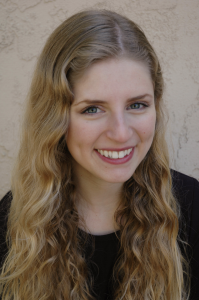 Hello! I’m Olivia Capizzi, and I am a third year double majoring in Music and Psychology & Social Behavior. I am a guest voice teacher for Segerstrom High School through the Creative Connections program here at UCI. I love playing the drums, singing, watching too much tv, and playing with my two dogs. Throughout my time as a music major, I have taken several classes involving musical analysis, and I found a love for analyzing how music contributes to storytelling. I have always had a passion for reading and other media, and developing this seminar has given me a chance to explore in depth the ways in which different mediums and art forms portray stories. This is a subject very close to my heart, and I’m very excited to share it with you all spring quarter!
Hello! I’m Olivia Capizzi, and I am a third year double majoring in Music and Psychology & Social Behavior. I am a guest voice teacher for Segerstrom High School through the Creative Connections program here at UCI. I love playing the drums, singing, watching too much tv, and playing with my two dogs. Throughout my time as a music major, I have taken several classes involving musical analysis, and I found a love for analyzing how music contributes to storytelling. I have always had a passion for reading and other media, and developing this seminar has given me a chance to explore in depth the ways in which different mediums and art forms portray stories. This is a subject very close to my heart, and I’m very excited to share it with you all spring quarter!
Course Description: “After nourishment, shelter and companionship, stories are the thing we need most in the world.” – Philip Pullman. This seminar will explore the ways in which writers and artists utilize their different mediums in order to tell stories. We will focus on storytelling in its many forms: film, music, literature, dance, and more. We will study stories that have been adapted across mediums in order to gain an awareness of the conventions of each genre and to discuss the changes that occur with each retelling of a story. The course will go over several stories, but will focus on the core texts, Cinderella and Romeo and Juliet, for two main reasons: they are well known enough for students to engage in discussion about them (but if you are unfamiliar with them, don’t worry!), and both stories have been adapted in many forms and genres over the years.
Enrollment Information:
Time: Th 9:30-10:50am
Place: TBD
Course Code: 87632
Faculty Mentor: Dr. Seth Houston
Back to Top
Online Game Behavior, Toxicity in Online Gaming Communities
Dan Tran
Major: International Studies and Informatics
Biography: My name is Dan Tran and I am a fifth year International Studies and Informatics double major; once a Computer Game Science major. I am a gamer of all kinds (board gamers, you are not forgotten), a pseudo-foodie, and an optimistic pessimist. My favorite place to be is at an airport. They’re arguably the presence of all cultures that go to and fro, or perhaps the lack of it all. I guess they are a bit like games where they can take a person to places they normally cannot. My deepest desires involve gaming and whence tired with being a game’s pawn – game design. With my mentor Prof. Katie Tekinbas, I have adorned my Hazmat suit and waded into the murky, grief-filled and troll-ridden not-so-underground environment of games and their communities.
My name is Dan Tran and I am a fifth year International Studies and Informatics double major; once a Computer Game Science major. I am a gamer of all kinds (board gamers, you are not forgotten), a pseudo-foodie, and an optimistic pessimist. My favorite place to be is at an airport. They’re arguably the presence of all cultures that go to and fro, or perhaps the lack of it all. I guess they are a bit like games where they can take a person to places they normally cannot. My deepest desires involve gaming and whence tired with being a game’s pawn – game design. With my mentor Prof. Katie Tekinbas, I have adorned my Hazmat suit and waded into the murky, grief-filled and troll-ridden not-so-underground environment of games and their communities.
On the not-so-off chance I’ve succumbed to my laziness, one can find me streaming myself speed-eating or adding a new entry to my ever-growing catalog of ramen reviews. I have a dream to a day where the “pc-master race” can play nicely with those “console scrubs.” A boy can only wish…
Course Description: Games are otherworldly experiences for users of all ages, genders, and races to enjoy and accomplish things that they could not otherwise. However, when the villains and evils of the world enter, toxicity is created. This course explores the definition of toxicity, bad behavior, and the notorious, boss-like Troll. From player psychology and demographics, and notable events of toxicity, to real-world effects of bad behavior, ONLINE GAME BEHAVIOR attempts to consolidate toxicity’s history, its reasons for existence, its influences, and finally what we, as the heroes of our own game, can do to combat this spreading darkness. This course attempts to arm students with the ability or weapons, one could say, to assess the behavior, and take the proper action. If anything has ever been learned from games, as it gets more difficult, you are going the right way. “Every puzzle has an answer.” Professor Layton, Professor Layton and the Curious Village
Enrollment Information:
Time: W 1:00- 1:50pm
Place: DBH 1420
Course Code: 87640
Faculty Mentor: Dr. Katie Salen Tekinbas
Back to Top
Reviving Disney’s Movie Magic
William Anderson
Major: English
Biography: 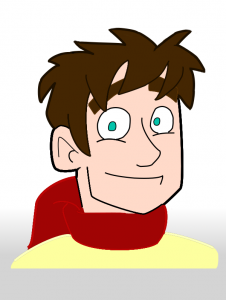 Alola! My name is Will Anderson. I’m a fourth-year English major going for an emphasis in creative writing. Fiction is my form of choice, and I got my start in writing fanfictions. I hope to pursue writing in the video game industry because I believe that a well-written story is the key element that makes or breaks a game, or any media for that matter. I may be an English major, but that doesn’t mean I’m not spreading myself across campus; I volunteer my sparetime on campus to two computer science projects. I’m currently the writer for the in-development game Magia Transformo, and I help prepare the campus’ largest living archive of video games spanning 40 years of history.
Alola! My name is Will Anderson. I’m a fourth-year English major going for an emphasis in creative writing. Fiction is my form of choice, and I got my start in writing fanfictions. I hope to pursue writing in the video game industry because I believe that a well-written story is the key element that makes or breaks a game, or any media for that matter. I may be an English major, but that doesn’t mean I’m not spreading myself across campus; I volunteer my sparetime on campus to two computer science projects. I’m currently the writer for the in-development game Magia Transformo, and I help prepare the campus’ largest living archive of video games spanning 40 years of history.
Off campus, you can expect to see me engrossed in one of my three loves: Nintendo, Disney, and baking. Some days I’m saving princesses or catching ‘em all, some days I’m belting out the high notes to “Let it Go.” Other days I just want cookies.
Course Description: The Walt Disney Animation Studio has a storied history unlike any other. From successes and innovations to slumps and near ruin, the studio has experienced it all through the ages, and now they are reaching the apex of another high era. Some would say this past decade has been a “Revival,” but what elements of these films makes this so? This course will explore the different aspects that make this era one to rival even the great Renaissance era of the 90’s. Representation on screen and off, the sources for and creators of a film’s content, and even the writing and effectiveness of certain songs in the films are just some of the topics we will explore. Though this course will analyze these texts under a critical lens, active imaginations and Mickey ears are encouraged.
Enrollment Information:
Time: W 11:00-12:20pm
Place: TBD
Course Code: 87639
Faculty Mentor: Dr. Bonnie Ruberg
Back to Top
Sociology of TV Animation
Jasmine Lopez-Logan
Majors: Sociology and Political Sciences
Minor: Art History
Biography:  Hi y’all, welcome comic lovers and weeabos alike! My name is Jasmine Lopez – Logan, I am a current 2nd year here at UCI, double majoring in Sociology and Political Science and minoring in Art History. My first spark of interest for this topic came from my own personal interaction with U.S comic series like Batman and Superman and their adaptions into TV animation. What made me double take at these renditions though was not its artistry (while it was amazing) or its actual story but rather the way I digested these works. Whenever I read comics I constantly felt engaged and aware of the material I was consuming (its morals, hero’s values, social commentary) yet on TV I would become enraptured and lost in the show only to realize much later its possible meaning. Why? I experienced this time and time again even with its international sister comic type, Manga and Anime. So with the awesome resources here at UCI, I decided to tie in my love for Sociology with my own personal question to create an academic space for animation lovers and readers alike!! That being said, I can’t wait to meet you all and I hope you’re as excited for our time together this Spring Quarter as I am!
Hi y’all, welcome comic lovers and weeabos alike! My name is Jasmine Lopez – Logan, I am a current 2nd year here at UCI, double majoring in Sociology and Political Science and minoring in Art History. My first spark of interest for this topic came from my own personal interaction with U.S comic series like Batman and Superman and their adaptions into TV animation. What made me double take at these renditions though was not its artistry (while it was amazing) or its actual story but rather the way I digested these works. Whenever I read comics I constantly felt engaged and aware of the material I was consuming (its morals, hero’s values, social commentary) yet on TV I would become enraptured and lost in the show only to realize much later its possible meaning. Why? I experienced this time and time again even with its international sister comic type, Manga and Anime. So with the awesome resources here at UCI, I decided to tie in my love for Sociology with my own personal question to create an academic space for animation lovers and readers alike!! That being said, I can’t wait to meet you all and I hope you’re as excited for our time together this Spring Quarter as I am!
Course Description: Cartoons are safe, they lead their young audience to believe the lives of imaginative characters like: Naruto Uzumaki the No.1 Leaf Village Shinobi or Steven Universe the optimistic fourteen year old half gem/half human boy, couldn’t possibly have any relation to “real-life experiences”. And while it may be true their spectacular adventures may not be in our likely future, what makes these shows so engaging is their individual character relatability and impactful symbolism. For example, could Naruto’s Shinobi War be commentary on the rising tension between the West and Middle East infamously driven by certain militant groups? Essentially, the objective of this course is to identify, observe, and analyze social interaction of popular TV animations with audiences to obtain better understanding of their role in our society. By the end of our time together students will be expected to have achieved: an introductory grasp of the main concepts, themes, theories, and terminology related to the field of study found in global business relations, political attitudes, and personal conversation.
Enrollment Information:
Time: M 2:00- 2:50p
Place: DBH 1422
Course Code:87636
Faculty Mentor: Dr. Sabrina Strings
Back to Top
Sound in Video Games
Edwin Sookiassian
Major: Computer Gaming Science
Biography:  My name is Edwin Sookiassian and I am a senior computer game science major here at UCI. My passion for video games has been an enduring factor in my life, but it’s video game’s ability to tacitly transfer knowledge and ideas that attracted me to the world of video game development. Because I was constantly exposing myself to video games I resonated with, the in-game experiences in which I was immersed helped me construct and reinforce my values. It wasn’t until I realized that most of my core values, like the importance of maintaining and protecting relationships with friends and family, stemmed from my experiences with video games like the Final Fantasy series, that I chose to pursue game development as a career. I am especially interested in the various ways sound can be used to shape these immersive in-game experiences and hope to work with sound in games in the future.
My name is Edwin Sookiassian and I am a senior computer game science major here at UCI. My passion for video games has been an enduring factor in my life, but it’s video game’s ability to tacitly transfer knowledge and ideas that attracted me to the world of video game development. Because I was constantly exposing myself to video games I resonated with, the in-game experiences in which I was immersed helped me construct and reinforce my values. It wasn’t until I realized that most of my core values, like the importance of maintaining and protecting relationships with friends and family, stemmed from my experiences with video games like the Final Fantasy series, that I chose to pursue game development as a career. I am especially interested in the various ways sound can be used to shape these immersive in-game experiences and hope to work with sound in games in the future.
Course Description: Sound in Games provides an introduction to the psychological and physiological (psychoacoustic) effects of sound perception. In this class, we will look at sound perception depending on the sound properties (pitch, harmonics, tempo, timbre, etc), and relate it to sound design in video games. You will learn about, as well as experience, these psychoacoustic responses through lectures, readings, discussions, videos/game examples, and in-class activities like playtesting.
Enrollment Information:
Time: M 4:00- 4:50p
Place: DBH 1420
Course Code: 87642
Faculty Mentor: Dr. Kurt Squire
Back to Top
